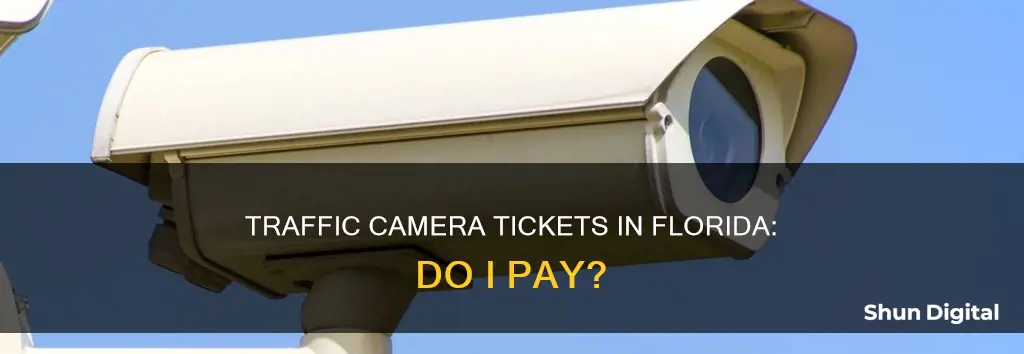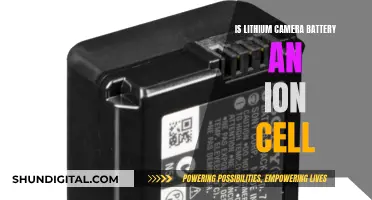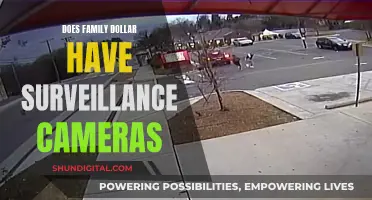
Florida's red light cameras are a controversial topic. While some people believe they are an effective way to improve road safety, others argue that they are a money-making scheme. Red light camera tickets typically cost $158, but this can increase to $262 if not paid promptly. If you receive a ticket, you have several options: pay the fine, contest the citation, or take a driver improvement course. Ignoring the ticket can lead to a suspended license and higher fines. Florida's red light camera program has sparked debates about legality, effectiveness, and fairness, with critics arguing that the system unfairly targets drivers and raises revenue for local governments.
| Characteristics | Values |
|---|---|
| What happens if you get a red light camera ticket in Florida? | The registered owner of the vehicle will receive a ticket in the mail. |
| How much is the fine? | $158 for the first notice (formally called a Notice of Violation). This increases to $262 for the second notice, which is counted as a ticket and adds points to your license. |
| How do you pay? | By phone, mail, or online. |
| What happens if you don't pay? | Your fine will increase, you will incur court costs, and you may have points added to your license. Your license may also be suspended, and you may have to pay higher fines and a fee to reinstate your driver's license. |
| How do you contest a ticket? | You can contest a ticket in court. It is recommended that you contact a local attorney who specializes in traffic tickets. |
| What happens if you ignore a ticket? | Your license may be suspended, you may have to pay higher fines, and you may have to pay a fee to reinstate your driver's license. |
| How do you check if you have a red light ticket? | Check your driver's license on the License Check website provided by the Florida DMV, call the local courthouse, or call American Traffic Solutions (ATS). |
| What happens if you don't stop at a red light but you're turning right? | You can still expect to receive a ticket in the mail. |
| What happens if you drive through a yellow light? | You won't get ticketed for this. |
| What happens if someone else is driving your car and they get a red light camera ticket? | As the registered owner of the vehicle, you will still be liable and will receive the ticket. |
| Are red light cameras legal in Florida? | Yes, the Florida Supreme Court ruled that red light cameras are legal and can be used in the interest of public safety. |
What You'll Learn

How much do red light camera tickets cost?
In Florida, the cost of a red light camera ticket varies depending on the county, but it typically costs $158. This fine must be paid within 30 days of receiving the ticket. If you pay within 30 days, no points are added to your driving record. However, if you don't pay within this time frame, the fine increases to a minimum of $262, plus court costs, and three points are added to your license.
It's important to note that the registered owner of the vehicle will receive the ticket, regardless of who was driving at the time of the violation. If you receive a red light camera ticket, you have a few options: pay the fine, contest the citation, or take a driver improvement course. If you choose to pay the fine, you can do so online or by visiting the clerk's office in the county where the violation occurred.
If you want to contest the citation, you must contact the Clerk of Court in the county where the violation took place. You may also be eligible to take a driver improvement course, which can result in an 18% reduction in citation fees and withheld points. However, you must elect to take the course within 30 days of receiving the citation.
Preventing Unwanted Auto-Focus: Tips for Sharp Photography
You may want to see also

Who is liable for the ticket?
In the state of Florida, the owner of the vehicle is liable for a red light photo citation. This means that if you lend your car to someone and they trigger a red light camera, you will be the one to receive the citation. The ticket is usually mailed to the vehicle's registered owner.
In some situations, such as with a recently sold car under new ownership or a stolen vehicle, the citation can be dismissed with the submission of an affidavit. It is recommended that drivers seeking dismissal consult a local attorney who specializes in traffic tickets for proper guidance.
If you receive a red light traffic ticket and do not contest it, you must pay the fine listed on the ticket within 30 days of receiving it. The first notice does not add points to your license. However, if you miss this deadline, your fine will increase, and you will also incur court costs and three points on your license.
Understanding Dual File Formats in Photography
You may want to see also

How do I check if I have a red light ticket?
If you have been caught running a red light in Florida, you will receive a ticket in the mail. This is usually the case whether you were driving your own car or someone else's. The registered owner of the vehicle will receive the bill.
A red light ticket in Florida usually costs $158, but if you don't pay the offence after your first notification, this will increase to $262. This second notification is counted as a ticket, and points will be assessed on your license for the violation.
To check if you have a red light ticket, you should check your mail. If you have received a ticket, you will need to pay the fine within 30 days of receiving it. If you ignore the citation, your license may be suspended, and you will face higher fines and reinstatement fees.
You can also check the status of your driver's license online at the Florida Department of Highway Safety and Motor Vehicles' Driver License Check page. Here, you can see if any points have been added to your license as a result of a red light ticket.
If you plan to contest the violation, you should consult a local attorney who specializes in traffic tickets. They can guide you through the process and help you gather and present evidence.
Syncing Camera Raw: A Step-by-Step Guide
You may want to see also

What are the consequences of not paying?
Florida's red-light cameras are a relatively new photo enforcement technology that is becoming more and more prevalent in Florida intersections. These cameras are used to automate the process of recording drivers committing a red-light violation. As a driver passes over a sensor in the intersection while the traffic signal is red, a camera is activated, taking pictures of the driver and their front license plate.
If you receive a traffic ticket from a red-light camera and do not choose to contest the citation, you must pay the fine listed on the ticket within 30 days of receiving it. If you do so, no points are added to your record. However, if you miss this deadline, not only will your fine increase, but you will also incur court costs and three points on your license.
Continuing to ignore a red-light camera ticket can result in several consequences. Firstly, your license may be suspended. This can significantly impact your ability to drive legally and may require additional steps to reinstate your driving privileges. Secondly, you may face even higher fines and penalties if you continue to ignore the citation. These additional costs can become a financial burden. Finally, ignoring a red-light camera ticket can lead to increased insurance premiums. Insurance companies often view these violations as a higher risk, which can result in increased insurance rates.
It is important to note that the consequences of not paying a red-light camera ticket may vary depending on the specific county or jurisdiction in Florida. Each county may have its own procedures and penalties for these types of violations. Therefore, it is always advisable to review the information provided by the specific county where the violation occurred. This information can usually be found on the county's website or by contacting the local authorities.
Old Cameras: Ancient Computers or Not?
You may want to see also

How can I contest the ticket?
If you receive a traffic ticket from a red light camera in Florida and you do not want to pay the fine, you can choose to contest the citation. Here is a step-by-step guide on how to do that:
Step 1: Understand the Violation
Check your ticket for accuracy and identify the specific violation you have been cited for. Look up the relevant traffic laws and understand the requirements and regulations. This will help you identify the basis for your defence.
Step 2: Gather Evidence
Collect all relevant information and evidence related to the incident. Record details such as the time, location, weather conditions, traffic conditions, and any other factors that may be relevant. Take photographs of the location and gather eyewitness statements from anyone who was present. Obtain the name, badge number, and patrol car number of the issuing officer, along with any reports or notes they made about the incident.
Step 3: Identify Defences
Build your case by identifying potential defences. You can refer to the following strategies:
- Dispute the officer's personal opinion or judgment: If the citation involves the officer's subjective opinion, such as an unsafe lane change, you can challenge their conclusion by presenting evidence of weather and traffic conditions that justified your actions.
- Dispute the officer's evidence: If the citation involves clear-cut infractions, such as running a stop sign, you can question whether the officer had a clear view and accurate assessment of the situation. Present eyewitness statements, diagrams, or photographs that contradict their observations.
- Present a "mistake of fact": If you made a reasonable mistake due to unclear or obscured signage, worn lane markers, or other circumstances beyond your control, you can argue that you were not adequately notified of the traffic regulation.
- Justify your driving: Admit to the violation but provide evidence that your actions were necessary to prevent harm or ensure safety. For example, if you were speeding to pass a potentially drunk driver, present evidence of their erratic driving and explain that you maintained a safe speed after passing them.
Step 4: Consult an Attorney
Consider consulting a local attorney who specialises in traffic tickets. They can guide you through the legal process, ensure you meet deadlines, and help you gather and present evidence effectively.
Step 5: Contest the Ticket
Contact the Clerk of Court in the county where the violation occurred to initiate the process of contesting the citation. You may request a hearing, and if the judge determines that you have committed the offence, they may impose a penalty and/or require you to complete a driver improvement course.
Making Pinhole Cameras: A Step-by-Step Guide
You may want to see also
Frequently asked questions
Yes, you do have to pay traffic camera tickets in Florida. Failure to pay the fine within 30 days of receiving the ticket can result in court costs, suspension of your license, and higher fines.
A traffic camera ticket in Florida typically costs $158. However, the cost can vary across counties and depending on your driving record, with some tickets costing up to $1,000.
If you do not pay your traffic camera ticket within 30 days, your fine will increase, and you will incur court costs and three points on your license. Continuing to ignore the citation can lead to a suspended license, even higher fines, and the cost of reinstating your driver's license.
You can pay your traffic camera ticket by phone, mail, or online. To pay by phone, call 1-866-225-8875. To pay by mail, send a check or money order to your county court. To pay online, visit www.payflclerk.com or www.violationinfo.com.







